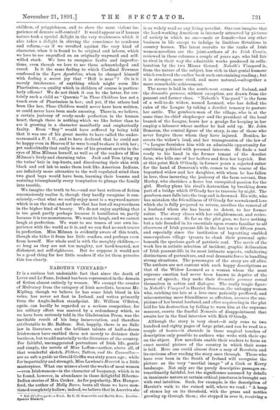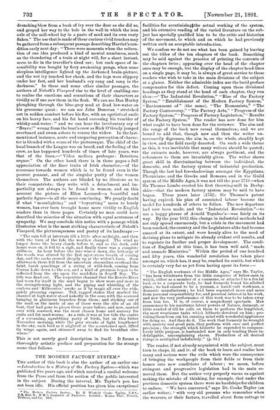NABOTH'S VINEYARD.* IT is a curious but undeniable fact that
since the death of Lever and Le Fanu, Ireland has been represented in the domain of fiction almost entirely by women. We exempt the creator of Mulvaney from the category of Irish novelists, because Mr. Kipling, though we believe he has some Irish blood in his veins, has never set foot in Ireland, and writes primarily from the Anglo-Indian standpoint. Mr. William O'Brien, again, can hardly be regarded as a serious competitor, for his solitary effort was marred by a redundancy which, as we have been seriously told in the Gladstonian Press, was the inevitable result of his long incarceration, and therefore attributable to Mr. Balfour. But, happily, there is no Salle law in literature, and the brilliant talents of half-a-dozen Irishwomen have enabled them not merely to distance their brethren, but to add materially to the literature of the country. For faithful, unexaggerated portraiture of Irish life, gentle and simple, the novels of Miss Laffan—author, above all, of that wonderful sketch, Fluters, Tatters, and the Counsellor— are as safe a guide as Gerald Griffin was sixty years ago ; while for impartiality and strength, Miss Lawless's Hurrish is a little masterpiece. What one misses about the works of most women —even Irishwomen—is the character of buoyancy, which is to be found, however, in abundance in those delightful Hiberno- Indian stories of Mrs. Croker. As for popularity, Mrs. Hunger- ford, the author of Molly Baum, beats all those we have men- tioned completely hollow; indeed, we believe that in America she
• Nab,th's Vineyard a Nova By E. CE. Somerville and Martin Ross. London : Spencer Blaekett.
is as widely read as any living novelist. One can imagine that the hard-working American is intensely attracted by pictures of society in which no one—male or female—has any other business in life except to indulge in limitless flirtations in country houses. The latest recruits to the ranks of Irish women-novelists are the joint-authors of An Irish Cousin, reviewed in these columns a couple of years ago, who bid fair- to rival in their way the admirable works produced in colla- boration by the two Misses Gerard. Naboth's Vineyard is, from the nature of the subject, less rich in that genial humour which rendered the earlier book such entertaining reading ; but it is stronger, more vivid, and more natural,—altogether a more remarkable achievement.
The scene is laid in the south-west corner of Ireland, and the dramatis persona, without exception, are drawn from the peasant and farmer class. "Naboth's Vineyard" is the farm of a well-to-do widow, named Leonard, who has defied the rules of the League by taking a derelict tenancy to pasture her cattle. The gombeen-man of the village, who is at the same time its chief shopkeeper and the president of the local branch of the League, bears her a grudge for keeping in her employ a labourer whose mother he had sold up. Mr. John Donovan, the central figure of the story, is one of those who. never forgive those whom they have injured. Besides, he covets the widow's land, and her transgression of the law of "-e. League furnishes him with an admirable opportunity for combining political with personal interests. He finds a tool ready to his hand in the former tenant of the derelict farm, who kills one of her heifers and fires her hayrick. But at this point Rick O'Grady, in former years a rejected suitor for the hand of Donovan's wife, comes to the rescue of the boycotted widow and her daughter, with whom he has fallen in love, thus incurring the jealousy of the farm servant, Dan Hurley, who cherishes a fierce but unrequited passion for the girl. Hurley plans his rival's destruction by breaking down part of a bridge which O'Grady has to traverse by night. The • gombeen-man falls into the trap and is drowned. His wife, who has mistaken the friendliness of O'Grady for reawakened love which she is fully prepared to return, ascribes the removal of a husband whom she has learnt to detest, to her former suitor. The story closes with her enlightenment, and retire- ment to a convent. So far as the plot goes, we have nothing but a tale founded in its essentials upon events familiar to all observers of Irish peasant-life in the last ten or fifteen years, and especially since the institution of boycotting enabled unscrupulous village tyrants to cloak their personal spite beneath the specious garb of patriotic zeal. The merit of the work lies in artistic selection of incident, graphic delineation of Irish peasant-life in its most intimate aspects, unfaltering distinctness of portraiture, and real dramatic force in handling strong situations. The personages of the story are all alive.
The authors are not content with such happy descriptions as that of the Widow Leonard as a woman whom the most supreme emotion had never been known to deprive of the power of speech ; they make their dramatis persona reveal themselves in action and dialogue. The really tragic figure in Naboth's Vineyard is Harriet Donovan, the unhappy woman who, catching too late at a love once patiently proffered, and misconstruing mere friendliness as affection, arouses the sus- picions of her brutal husband, and after acquiescing in the plot laid for his destruction by failing to warn him at the supreme moment, courts the fearful Nemesis of disappointment that awaits her in the final interview with Rick O'Grady.
Although the story is very short—it only runs to two hundred and eighty pages of large print, and can be read in a couple of hours—it abounds in those magical touches of description only possible to authors who write with their eye on the object. Few novelists enable their readers to form an exact mental picture of the country in which their scene is laid. Here one could almost draw a map of Rossbrin and its environs after reading the story once through. Those who have ever been in the South of Ireland will recognise the picture as the very " mortial image" of a Cork or Kerry landscape. Not only are the purely descriptive passages ex- traordinarily faithful, but the significance assumed by details
in inanimate nature at certain critical junctures is brought out with real intuition. Such, for example, is the description of Harriet's walk to the ruined mill, where we read : " A heap of stones lay on its threshold, with the grass and nettles growing up through them ; she stepped in over it, receiving a
drenching blow from a bush of ivy over the door as she did so, and groped her way to the bole in the wall in which the iron axle of the mill-wheel lay in a paste of mud and its own rusty flakes." The use that is made of these curious vivid touches may be gathered from a subsequent passage describing Harriet's con- dition early next day : "There were moments when the reitera- tion of one idea produced a kind of mental numbness, much as the thundering of a train at night will, for a short instant, seem to die in the traveller's tired ear ; but each space of in- sensibility was bought by fiery awakening pangs, when some sleepless intelligence lighted up the darkened brain-picture, and the wet ivy touched her cheek, and the logs were slippery under her feet, and her husband's cry rang and rang in the darkness." In these and some other similar passages, the authors of Naboth's Vineyard rise to the level of enabling one to realise the emotions and sensations of their characters as vividly as if one saw them in the flesh. We can see Dan Hurley ploughing through the blue-grey mud at dead low-water on his gruesome quest : we can see John Donovan " stretched out in sodden comfort before his fire, with an egotistical smile on his heavy face, and his fat hand caressing his tumbler of whisky-and-water : " and we can hear the involuntary cry of "Bravo!" wrung from the boat's crew as Rick O'Grady jumped overboard and swam ashore to rescue the widow. In the last- mentioned instance, acute and unsparing perception of charac- ter is blended with a sense of the picturesque. The chief of the local branch of the League was on board, and the feeling of the crew, as has happened hundreds of times of late years, was that of the lines,—" Video meliora proboque : Deteriora sequor." On the other hand, there is in these pages a full appreciation of the finer traits of Irish character,—of the reverence towards women which is to be found even in the poorest peasant, and of the singular purity of the women themselves. The authors are blinded by no illusions as to their compatriots ; they write with a detachment and im- partiality not always to be found in women, and on this account the picture of Ellen Leonard—a beautiful and pathetic figure—is all the more convincing. We greatly doubt if what " moonlighting " and boycotting " mean to lonely women, has ever been brought home more vividly to English readers than in these pages. Certainly no man could have described the miseries of the situation with equal acuteness of sympathy. We may conclude this notice with a passage which illustrates what is the most striking characteristic of Naboth's Vineyard, the picturesqueness and poetry of its landscape :—
" The rain fell at intervals till a little after midnight, and then with the turn of the tide the weather changed. The wind no longer drove the heavy clouds before it, and as the dark, cold hours wore on, it fell to a sigh, and finally there was a complete stillness. An hour before the late winter dawn, the lethargy of the woods was stirred by the first mystarions breath of coming day, and the cocks crowed sleepily up at the widow's farm. Soon afterwards there fell from the uncertain obscurities overhead the faint, harsh quackings of a string of wild-duck, coming from Corran Lake down to the sea, and a kind of greyness began to be reflected from the sky upon the mud-flats in Scariff Bay. The tide was dead out. The serpentine channel that the Rowrie River had worn for itself in the mud began to show more and more in the strengthening light, and the piping and whistling of the curlews and Kilkeentra' awoke as if by magic all over the wide, -palely gleaming expanse. Tall, ragged stakes that marked the channel at high water stood nakedly in the ooze, with the seaweed hanging in glutinous branches from them ; and sticking out of the mud on the inside of one of these were the ribs of an old boat, that had gone to pieces there years before, and now, matted over with seaweed, was the most chosen home and nursery for crabs and fat mud-worms. As a rule, it was at low tide the centre of a screaming, squabbling party of birds, but on this bitter November morning, while the grey streaks of light lengthened in the sky, each bird as it alighted at the accustomed spot, lifted its wings again, and skimmed away to find its breakfast else- where."
This is not merely good description in itself. It forms a thoroughly artistic preface and preparation for the strange scene that follows.



















































 Previous page
Previous page